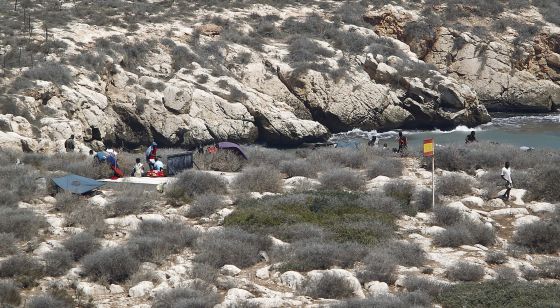At least 81 people are now waiting on the shores of Sifha beach
Foreign minister hoping that Rabat will come up with “hardline solution”
MÓNICA CEBERIO BELAZA / AGENCIES Alhucemas / Madrid

Immigrants on Isla de Tierra, off the shores of Morocco. / ULY MARTÍN (EL PAÍS)
Spain and Morocco on Monday continued to look for a common solution to stop the growing influx of sub-Saharan migrants who have been seeking refuge on tiny Spanish rocky islets, including Isla de Tierra, with the hopes of making it to the mainland.
At least 81 sub-Saharans are waiting on the shores of Isla de Tierra’s Sifha beach for the Spanish government’s decision on whether or not to take them to a holding center in Melilla or to the Spanish mainland. They say they do not want to be returned to Morocco.
Spain, meanwhile, is awaiting Morocco’s help to solve the crisis.
Foreign Minister José Manuel García-Margallo said he hopes that Rabat will eventually come up with “a hardline solution” to stop the migrants from reaching these islets, which they see as a possible springboard to get to Spain.
“We are confident that we will find a formula of cooperation between the two governments,” Margallo said at a press conference, explaining that he hopes Morocco will help control access to other islets that belong to Spain, such as Chafarinas, Vélez and Peñón de Alhucemas, where migrants also landed last month.
Isla de Tierra is so close to the Moroccan shoreline that by wading and swimming, using life jackets or by forming a human chain, anyone can easily reach the rocky islet. There are two military tents and a black Zodiac speedboat located on the nearby Moroccan shore.
The landing of the sub-Saharan migrants began last Wednesday with the arrival of a first group, with more arriving throughout the weekend. According to Margallo, the situation worsened on Sunday morning when a bigger group of 68 landed. In all, there are 81 people on the rocks near the beach, with no shade to cover them given the lack of trees, and nothing to do but wait.
Humanitarian workers, who have been helping others in Alhucemas, are offering them food and medical treatment.
Margallo blamed the problem on human-trafficking mafias.
At around the same time the 68 migrants arrived at Isla de Tierra, another 60 sub-Saharans tried to jump the fence that divides the border between Morocco and the Spanish exclave Melilla. The government delegate in Melilla said that they failed in their attempt.






